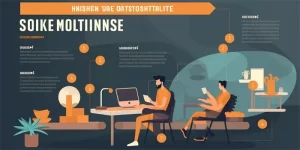In recent years, advancements in Artificial Intelligence (AI) have significantly impacted various industries, and the music production industry is no exception. AI technology has revolutionized the way music is created, produced, and consumed. From composing melodies to enhancing audio quality, AI is reshaping the future of music production in numerous ways.

1. AI-Generated Music:
AI algorithms can now compose original music using vast databases of existing compositions. Through machine learning, AI systems can analyze patterns and create unique compositions that fit specific genres or moods. This opens up new possibilities for musicians, as they can leverage AI to generate fresh ideas or overcome creative blocks.
However, some argue that AI-generated music lacks the emotional depth and authenticity that human composers bring. The balance between human creativity and AI-generated compositions remains a topic of debate.
2. Audio Enhancement:
AI tools and software such as Izotope RX and Accusonus ERA can enhance audio quality by removing background noise, improving clarity, or automating the mixing and mastering process. These tools analyze audio signals and make intelligent adjustments to enhance the overall sound quality, saving time for music producers and engineers.
However, there are concerns about the over-reliance on AI for audio enhancement, as it may lead to a standardized and homogenized sound devoid of individuality.
3. Virtual Instruments and Orchestras:
AI technology has paved the way for virtual instruments and orchestras, eliminating the need for physical musicians in certain scenarios. Companies like Spitfire Audio and Native Instruments offer highly realistic virtual instruments that can replicate the sounds of traditional orchestral instruments with incredible accuracy.
While virtual instruments offer convenience and cost-efficiency, the debate arises regarding the authenticity and irreplaceable nuances that live musicians bring to performances.
4. Intelligent Recommendations:
Streaming platforms like Spotify and Apple Music already employ AI algorithms to analyze listener preferences and provide personalized recommendations. These algorithms examine listening history, genre preferences, and user behavior to suggest new artists or songs, facilitating music discovery for both listeners and emerging artists.
However, concerns about AI-driven recommendation algorithms creating filter bubbles and limiting exposure to diverse genres and artists have been raised.
5. Vocal Processing and Synthesis:
AI-driven vocal processors and synthesis software, such as Autotune and Vocaloid, have transformed the way vocals are recorded and manipulated. These technologies can correct pitch in real-time, add harmonies, or generate entirely new vocal performances based on a given melody.
While these tools offer incredible creative possibilities, the risk of overusing them and sacrificing the authenticity and uniqueness of a natural vocal performance persists.
6. Copyright and Plagiarism Detection:
With the vast amount of music available today, AI-powered systems like Shazam and Content ID have become vital for detecting copyright infringement and plagiarism. These systems analyze audio fingerprints to identify unauthorized use of copyrighted material and protect the rights of musicians and creators.
However, false positives and the potential for misuse or abuse of such systems raise concerns regarding artistic freedom and fair usage principles.
7. AI-Powered Collaboration and Remixing:
AI platforms like Amper Music and Jukedeck allow musicians and producers to collaborate with AI systems to generate music. These platforms provide pre-recorded musical elements that can be combined and modified to create unique compositions.
While AI-powered collaboration offers convenience and expands creative possibilities, some argue that it may decrease the value of human input in the creative process.
8. Real-time Performance Augmentation:
AI technologies can also enhance live performances by analyzing incoming audio signals and making real-time adjustments. For example, Waves’ Soundgrid technology can automatically adjust sound levels and apply audio effects based on the performer’s style or the venue’s acoustics.
However, concerns about the impact of AI on the spontaneity and authenticity of live performances have been raised.
FAQs:
Q: Is AI replacing human musicians?
A: AI is transforming the music production industry, but it is unlikely to completely replace human musicians. It rather complements and augments their creativity and capabilities.
Q: Will AI-generated music be as emotionally powerful as music composed by humans?
A: While AI-generated music can be impressive, it often lacks the emotional depth and nuance that comes from human creativity and experience.
Q: Can AI tools replace the role of music producers and engineers?
A: AI tools can automate certain tasks and enhance efficiency, but the role of music producers and engineers extends beyond technical aspects. Their creative input and understanding of musical aesthetics are invaluable.
References:
1. Heil, B., Frühholz, S., & Iacobucci, I. (2020). Emotional processing in music: study design and implementation considerations. Psychology of Music, 48(3), 340-355.
2. Bonet, V., Sales, S., & Gómez Moreno, F.X. (2021). Artificial Intelligence in Models and Methods for Music and Sound Creativity. In: Springer Handbook of Systematic Musicology. Springer.
3. Future of Music Coalition. (2016). Artificial Intelligence and Music. Retrieved from https://futureofmusic.org/sites/default/files/Future%20of%20Music%20AI%20paper.pdf








